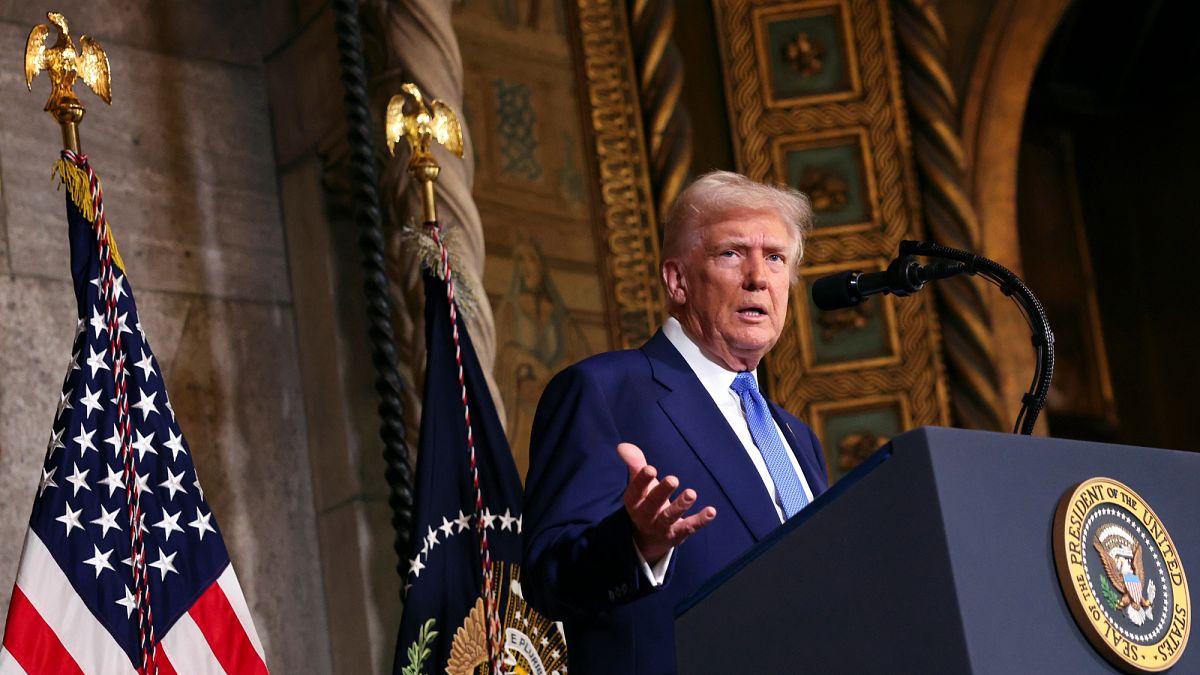Top US and Russian officials met for four hours Tuesday before President Donald Trump suggested that Kyiv was to blame for the conflict.
US President Donald Trump pushed back Tuesday against Ukraine’s objections to being excluded from talks between the US and Russia in Saudi Arabia aimed at ending the war in eastern Ukraine.
He also seemed to suggest that Ukraine was to blame for a war that began only after Russia invaded that country.
Speaking to reporters from his Mar-a-Lago estate, Trump said, “Today I heard, well, we weren’t invited. Well, you’ve been there for three years. You should have ended it three years. You should have never started it.”
Trump showed little patience for Ukraine’s objections to being excluded from the talks in Saudi Arabia. He said repeatedly that Ukraine’s leaders never should have allowed the conflict to begin, indicating Kyiv should have been willing to make concessions to Russia before it sent troops into Ukraine in 2022.
Such comments and Trump’s goal of mending ties with Moscow may come at a cost to the transatlantic alliance of the US and Europe and significantly damage Washington’s standing with Ukraine as well as with other nations counting on US leadership in NATO and elsewhere for their security and protection.
“A half-baked negotiator could have settled this years ago without the loss of much land, very little land, without the loss of any lives,” Trump said, echoing his frequent claim that he could have prevented the Russian invasion.
Trump said he thought he had a “good chance” to end Russia’s war in Ukraine but bristled at suggestions that the US and Russia had begun negotiations to end fighting occurring without Ukraine playing a role.
No intention to exclude Europe
Neither Ukraine nor European nations were invited to Tuesday’s talks in Riyadh, but U.S. officials said there is no intention to exclude them from peace negotiations should they begin in earnest.
“No one is being sidelined here,” said US Secretary of State Marco Rubio. “Obviously, there’s going to be engagement and consultation with Ukraine, with our partners in Europe and others. But ultimately, the Russian side will be indispensable to this effort.”
Trump’s national security adviser, Mike Waltz, noted that Trump spoke with Ukrainian President Volodymyr Zelenskyy immediately after speaking with Putin last week and that US Vice President JD Vance and Rubio met Friday with Zelenskyy in Germany.
Still, Zelenskyy was clearly peeved at being omitted from the meeting, postponing plans to visit Saudi Arabia on Wednesday to avoid any linkage of his trip with Tuesday’s US-Russia talks.
And that was before Trump’s comments suggesting Kyiv was at fault in starting the fighting.
“This whole negotiation from the start seems very tilted in Russia’s favour. And it’s even a question whether it should be termed a negotiation or in some sense, a series of American capitulations,” said Nigel Gould-Davies, senior fellow for Eurasia and Russia at the International Institute for Strategic Studies in London and a former British ambassador to Belarus.
Should the parties succeed in negotiating an end to the Ukraine conflict, Rubio said, it could open “incredible opportunities” to partner with the Russians “on issues that hopefully will be good for the world and also improve our relations in the long term.”
He did not say what those would entail.

